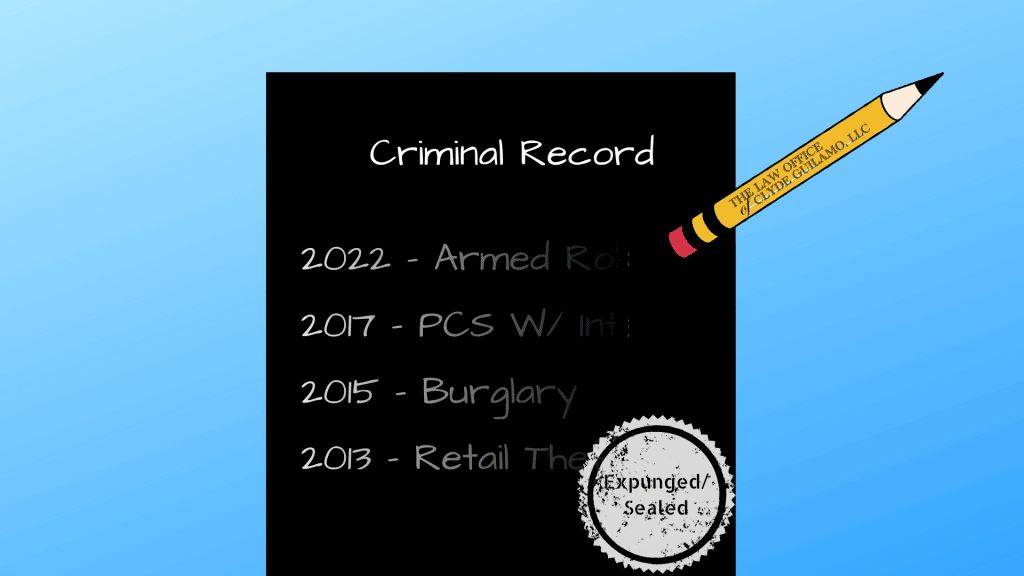
Everything You Need to Know About Expunging Your Criminal History in Illinois
Expungement Lawyer Serving Cook, DuPage, DeKalb, Grundy, Kane, Kankakee, Kendall, LaSalle, Lee, Ogle, and Will Counties
If you have ever had criminal charges filed against you, then you may have thought to yourself “will this come up in a background check for a new job?” Through a little research, you may come across the legal words “Expungement” and “Sealing.” In this article, I’ll explain the difference between the two and answer many of the common questions people have about expungements. By the end, you’ll be able to determine if your case is eligible for an expungement and the next steps that you should take. If you are still looking for an expungement lawyer, call Attorney Clyde Guilamo today for a free consultation.
Table of Contents

What do people see when they run your criminal history?
In Illinois, every time a person is arrested and/or convicted of an offense, notice of the arrest and/or conviction is sent to the Bureau of Identification branch of the Illinois State Police. It is the Bureau of Identification that is responsible for collecting, maintaining, and ultimately disseminating the information that makes up your criminal history.
Most people (which are non-criminal justice entities) that request your criminal history from the Bureau of Identification are only authorized to receive conviction information pursuant to State law (known as the Uniform Conviction Information Act). That means that the Bureau of Identification will not provide arrest information if your case:
- was never charged by the State;
- is still pre-trial;
- was charged but dismissed; and/or
- went to trial and was a not guilty
But please be aware: Adult criminal cases are public records and available for inspection by the public. 705 ILCS 105/16 (6). There are independent “criminal history” companies that compile that information and provide it to the public. Those companies do provide arrest information, even if the arrest did not result in a conviction. As a result, the best way to erase your criminal history is through an expungement.
What is an expungement?
“Expunge” means to physically destroy the records . . . and to remove your name from any official index or public record, or both. 20 ILCS 2630/5.2(a)(1)(E). At the completion of an expungement:
- The police agency (i.e. Chicago, Joliet, or Naperville Police Department) destroys the police reports documenting your arrest);
- The County Clerk’s office destroys the court file;
- The Bureau of Identification deletes the record of your arrest and/or conviction from their database.
After the expungement, if someone searches for:
- your police report number, then they will receive a blank entry;
- your case number at the clerk’s office, then the clerk will inform them that the file does not exist; and
- your name in a background check with the Illinois State Police; ISP will say “no records.”
An expungement restores you to the status that you occupied before the arrest, charge, or conviction. 20 ILCS 2630/5.2(j)(10).
What are the benefits?
There are many benefits a criminal expungement can have on your personal and professional life. Here are a few of the most common reasons why people ask me to expunge their criminal record:
- Employment. Most people seek an expungement for employment purposes. Many employers run a criminal background check on job applicants. Let’s face it, no one wants to explain the circumstances surrounding a criminal conviction from back in college during a job interview. Similarly, no one wants to disclose a one-time mistake from years ago on an employment application. Applying for a job and going through the interview process is stressful enough. With a successful expungement, you do not have to explain or even disclose a past mistake.
- Housing. You have been searching for weeks and found a beautiful home to rent. You look at the rental application and there it is in black and white “a non-refundable $50 fee for a background check.” Landlords prioritize someone without a criminal record over applicants with a criminal history. A successful expungement can eliminate the risk of being passed over for housing because of a criminal record.
- Credit or Loan Application. That’s right. You walked into a car dealership to get a loan on a brand-new car, and they want to run your criminal background. As a result of your criminal history, the dealership either charges you a higher interest rate or declines your loan altogether. And the crazy part is, your prior case has nothing to do with theft, dishonesty, or fraud. A successful expungement can eliminate any red flags a criminal record may have when trying to borrow money.
- Criminal Sentencing. If you are ever accused of another crime, your criminal history is a very important factor as to whether you’ll be released on bond and whether you qualify for certain programs or sentences. Even though you have successfully completed your earlier sentence, a prosecutor now wants to hammer you because of that earlier case. A successful expungement can significantly impact the outcome of any future criminal cases.
- Social Reasons. Your kid’s school is looking for volunteers to chaperon the next field trip. Or maybe you would like to be a Boy Scout troop leader or Sunday School teacher for your local church. There’s only one requirement: you submit to a background check! That’s right, a past mistake can get you excluded from a club, organization, or invitation because of something that happened years ago. A successful expungement can eliminate the risk of being passed up on those social activities.
- Peace of Mind. An expungement is the “closing of the book.” For people who are looking for closure, this is it. With a successful expungement, you can move on with your life knowing that this chapter is successfully behind you.
What kind of cases can be expunged?
You can expunge any criminal case where you were arrested and:
- Not charged;
- Dismissed;
- Resolved through a deferred prosecution or diversion program;
- Received court supervision;
- Were found not guilty;
- Received First Time Offender Probation, TASC probation, Second-Chance Probation, or any other program that allows for expungement upon successful completion; and/or
- Convicted but subsequently reversed or vacated. 20 ILCS 2630/5.2(b)(1).
When is the earliest that I can file?
No Waiting Period. There is no waiting period to file a petition to expunge if you were arrested and:
- Not charged;
- Dismissed;
- Resolved through a deferred prosecution or diversion program;
- Were found not guilty;
- Convicted but subsequently reversed or vacated.
Important: Just because there is no waiting period does not mean that the judge will automatically grant your request. A prosecutor could object on a case that was not filed or dismissed if the statute of limitations has not expired. They might want to charge you in the future.
2-Year Period. Generally, there is a 2-year waiting period to file a petition to expunge after the successful completion of supervision on misdemeanors, petty offenses, and business offenses. However, this period does not start if you have another pending case. The calculation begins when you have finished serving your last sentence on any case (not just the one you seek to expunge).
5-Year Period. There is a 5-year waiting period to file a petition to expunge if you successfully complete:
- Supervision for the following offenses:
- Operating an Uninsured Motor Vehicle;
- Operating a Motor Vehicle when registration has been suspended for noninsurance;
- Display of False Insurance Card;
- Violations of Required Records by Scrap Processors
- First Time Offender Probation,
- TASC Probation,
- Second-Chance Probation, and/or
- any other probation program that allows for expungement upon successful completion of the program.
Once again, the 5-year calculation begins when you finished serving your last sentence on any case (not just the one you seek to expunge).
Age of 25 Requirement. If 1) you committed the offense of Reckless Driving before you were 25 years old, 2) you received court supervision, and 3) you have no other conviction for Reckless Driving or Driving Under the Influence, then you must wait until your 25th birthday to file a petition to expunge. 20 ILCS 2630/5.2(b)(2).
What cases cannot be expunged?
Here is a list of cases that cannot be expunged:
- Minor Traffic Offenses (which is any petty offense, business offense, or Class C misdemeanor under the Illinois Vehicle Code);
- Civil Cases (i.e. lawsuits; evictions; foreclosures);
- Child Protection Cases (i.e. DCFS Abuse, Neglect, and Dependency Cases);
- Driving Under the Influence (DUI);
- Reckless Driving if you are 25 years old or older;
- Convictions; and
- Supervision on a sex offense committed against a minor.
Do I need to submit to a drug test with my petition?
You must submit a drug test to expunge felony records that resulted in:
- First Time Offender Probation;
- TASC Probation;
- Second-Chance Probation; and/or
- any other qualified probation program that allows for expungement upon successful completion. 20 ILCS 2630/5.2(d)(3).
Most petitions are not one of the above, so you probably don’t need a drug test. But if you do need a drug test, one question that you might have is: What if I test positive for cannabis which is now legal in the State of Illinois? Generally, most judges will not have an issue if you are positive for cannabis. Pro Tip: Get your drug test from one of the many urgent care facilities across Illinois. When they run your drug test, the panel that they use tests for everything except cannabis. With those tests, you should have clean negatives across the entire panel.
If your drug test shows a positive test result because of an active prescription such as methadone, suboxone, or hydrocodone, you can still get your case expunged. You’ll just need to provide a copy of both your drug test and your active prescription. The law recognizes that Medication-Assisted Treatment (or MAT for short) is a necessity for some habitual opiate users. You do not have to go against medical advice because you are seeking an expungement.
Can I obtain an expungement if I live out-of-state?
Yes! You do not need to reside in Illinois to expunge your Illinois criminal history. When your lawyer files and serves the appropriate parties (State’s Attorney, Illinois State Police, and local law enforcement agency), they must file any objections in writing within 60 days. If they do not object, then the hearing can occur with only your expungement lawyer and the State’s Attorney present. In many jurisdictions, you can appear at the hearing via Zoom.
How is an expungement different from an executive clemency?
If you do not qualify for an expungement, then you should speak with a lawyer about applying for an executive clemency. 730 ILCS 5/3-3-13. Here are the major differences between an expungement and an executive clemency:
- Decision Maker: Expungements are granted by the district court where the case was heard, while executive clemency is granted by the Governor.
- Limits on Authority: Illinois law does not allow judges to expunge every type of case (i.e. convictions on sex cases), while the Governor can allow the expungement of any case whatsoever.
- Scope of Authority: An expungement is limited to removing a case from your criminal history, while executive clemency can also include reducing your sentence (which is called “commute”) and reversing a conviction (which is called a “pardon”).
- Time Period to File: There are restrictions as to when you can file for an expungement, while there is no waiting period for requesting an executive clemency.
If you go the executive clemency route and are successful, then you would need to file a petition for expungement, informing the court that you have received clemency.
Pro Tip: To have the best chance at an executive clemency petition, I would highly recommend you put together a mitigation packet!
What is the difference between expunging and sealing your criminal history?
Both expunging and sealing a criminal record enable you to apply for a job and answer “no” to the question, “have you ever been convicted of a crime.” If that is your only goal, then you may not care about the differences between the two. But you should know that expunging your criminal record is much better than sealing it. Here are the reasons why:
- Definitions: “Expunge” is to erase while seal is “to hide.” This distinction plays a huge factor in the next difference in number 2.
- Criminal Sentencing: Some crimes have more serious penalties if this is your second or subsequent offense. For example, Retail Theft is a class A misdemeanor that becomes a class 4 felony if you have a prior retail theft. If you expunged your prior retail theft, then your current charge of retail theft would be a misdemeanor. If, however, you only sealed your prior retail theft, then your current charge could be charged as a felony.
- Eligibility: You can only expunge cases that did not result in a conviction or that you successfully completed a qualified probation (i.e., first offender, second chance, TASC). Sealing, however, applies to all those cases and many more. You can seal both misdemeanor and felony cases that resulted in convictions. (See my separate guide to sealing cases in Illinois).
- Time Period to File: You should only seal a case when you cannot expunge it. So, I won’t repeat the time frames that already apply to expunging cases. If your cases do not qualify for expungement but do qualify for sealing, then you must wait 3 years after the end of your last sentence to seal them.
What is the first step to getting an expungement?
You should obtain a copy of your criminal history. Your lawyer would review that rap sheet to determine what to seal, what to expunge, and what time periods apply to your specific situation. You would not want to pay for an expungement only to find out that it was denied because you were 2 years too early!
Other Legal Resources
If you are looking for information about:
- Domestic Violence Cases, then check out our Domestic Violence guides.
- Drug Cases, then check out our Drug Crime guides.
- DUI/Traffic Cases, then check out our DUI guide.
- Gun Cases, then check out our Gun Crime guides.
- Sex Cases, then check out our Sex Crime guides.
- Theft Cases, then check out our Theft Crime guides.
- Violent Cases, then check out our Violent Crime guides.
Hire Criminal Defense Attorney Clyde Guilamo
Lastly, I hope this guide of free legal education was helpful. #notlegaladvice. If you found this article helpful, consider giving us a review on Google! If you have specific questions about your case, then call me today for a free consultation:


